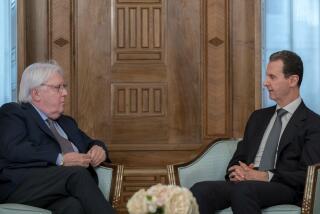Arabs to Back Up Saudis : Iraqi Leader Issues Call for Holy War
- Share via
CAIRO — A majority of Arab League nations agreed today to send Arab troops to protect Saudi Arabia from Iraqi aggression, approved economic sanctions against Baghdad and condemned the Iraqi invasion of Kuwait.
The moves came after Iraqi President Saddam Hussein defiantly called on Arabs throughout the Middle East to join in a holy war to sweep from power the Saudi royal family and seize the Muslim holy shrines in Saudi Arabia.
The Arab League action was by far the strongest Arab step against Hussein since the Aug. 2 invasion of Kuwait.
The Iraqi delegation reportedly denounced the measures and vowed that Baghdad will stand by its annexation of the emirate.
Of 20 Arab League member states present, 12 supported the seven-point resolution.
Libya, the Palestine Liberation Organization and Iraq voted against the package, Algeria and Yemen abstained, and Tunis was absent. Three governments expressed reservations and took no position.
Egypt’s representative to the United Nations, Amr Moussa, told reporters that details of the deployment of the Arab force will be worked out in contacts coordinated by the the league’s secretary, Chadli Klibi.
The gathering of Arab presidents and kings had been hastily convened with the goal of finding a diplomatic solution to the Persian Gulf crisis in order to stave off foreign intervention.
The approval of the measures came at a closed-door Arab League session that quickly turned stormy.
Conference sources said a shouting match broke out between delegations from Iraq and the Kuwait government it ousted. During the heated argument, the Kuwaiti foreign minister collapsed, the sources said.
Kuwait’s ousted emir, Sheik Jabbar al Ahmed al Sabah, whose family ruled Kuwait for more than 230 years, was present for the morning session. He sat two delegations over from a grim-faced Taha Yassin Ramadan, head of the Iraqi delegation.
One of the two pool reporters allowed in the meeting hall said the 62-year-old emir looked “terribly depressed. He looked as though he was near collapse.”
Before the afternoon session, the emir returned to Saudi Arabia, his home in exile.
Hussein’s defiant call to take back the Muslim shrines signaled that his intentions are broader than the annexation of Kuwait. His rhetoric aimed at presenting himself as a champion of Arabs and Muslims everywhere.
By inviting U.S. troops to protect Saudi Arabia, the Saudi leaders “are not only defying the Arab and Islamic nations . . . but are challenging God the day they put Mecca and the tomb of Mohammed under the grip of the foreigner,” Hussein said in a statement read by a spokesman on television.
“Your brothers in Iraq are determined on holy war, without hesitation and without any slowing down.
“We shall be victorious, God willing, and evil and corruption will be trampled wherever it is, the sun will rise on the Arabs and the Muslims and God will be happy after we purify our souls and land from the foreigners.”
His mention of foreigners was a clear reference to American and other Western forces in the region.
More to Read
Sign up for Essential California
The most important California stories and recommendations in your inbox every morning.
You may occasionally receive promotional content from the Los Angeles Times.











